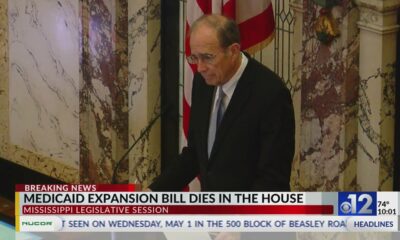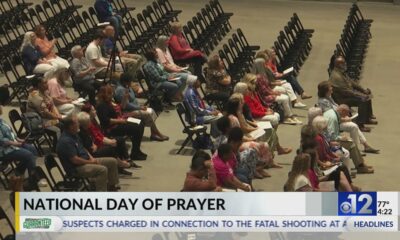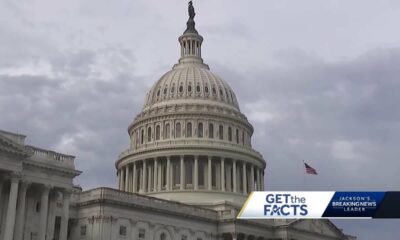Kaiser Health News
‘AGGA’ Inventor Testifies His Dental Device Was Not Meant for TMJ or Sleep Apnea
Brett Kelman and Anna Werner, CBS News
Fri, 22 Dec 2023 10:00:00 +0000
A Tennessee dentist who has been sued by multiple TMJ and sleep apnea patients over an unproven dental device he invented has said under oath that he never taught dentists to use the device for those ailments — contradicting video footage of him telling dentists how to use it.
Related Articles
-
This Dental Device Was Sold to Fix Patients' Jaws. Lawsuits Claim It Wrecked Their Teeth.
Mar 1, 2023
-
Watch: Dental Device at Center of Lawsuits Was Used on Patients Without FDA Review
Mar 2, 2023
-
Feds Launch Criminal Investigation Into ‘AGGA' Dental Device and Its Inventor
Apr 12, 2023
Steve Galella, the inventor of the Anterior Growth Guidance Appliance, or “AGGA,” has said in court depositions that his device had been used on about 10,000 patients, and that he trained many dentists to use the AGGA in classes around the U.S. and overseas.
At least 23 patients, some of whom described being desperate for relief from sleep apnea or temporomandibular joint disorder (TMJ), have sued Galella in recent years claiming that the AGGA damaged their mouths and, in some cases, caused tooth loss. Galella denied wrongdoing in those lawsuits and has settled almost all of them within the past few months.
Galella was deposed before he settled the largest of those lawsuits. According to a deposition transcript recently obtained by KFF Health News and CBS News, Galella said under oath that he had not represented that the AGGA could treat or cure TMJ or sleep apnea.
Video footage tells a different story.
Galella repeatedly references treating TMJ and sleep apnea patients with the AGGA, sometimes in conjunction with other devices, in footage from a training session he led with Australian dentists in 2017, which was produced in discovery in an AGGA lawsuit.
At one point in the footage, Galella can be seen displaying two versions of the AGGA to the dentists, pointing to one he says is preferred by “TMJ and sleep patients” — and then saying, “And I give it to them.”
“Can you cure TMJ? Yes,” Galella told dentists as his 2017 training began, according to the footage. “Can you cure mild to moderate sleep apnea? Yes.”
The AGGA, which Galella recently rebranded as the Osseo-Restoration Appliance, resembles a retainer and uses springs to apply pressure to the front teeth and upper palate, according to a patent application filed in 2021. This year, after a joint investigation by KFF Health News and CBS News reported allegations of patients harmed by the AGGA, the FDA and the Department of Justice opened investigations into the device.
Dentists across the country have promoted the AGGA on their websites, often claiming it can “grow,” “remodel,” or “expand” an adult's jaw without surgery, sometimes saying it has the potential to make patients more attractive and to treat common ailments like TMJ and sleep apnea, which afflict millions of Americans. Galella has said in depositions and video footage that the AGGA causes the bones in an adult's jaw to “remodel” forward, reshaping their face.
The 2017 video footage contains other examples of Galella teaching dentists to treat TMJ and sleep apnea patients with the AGGA, which he sometimes calls a “growth appliance.” In one segment, he describes using a growth appliance on “nine out of 10” of his TMJ patients. In another instance, Galella presents photos of what he says is a TMJ patient, then proceeds to describe how he treated them with an AGGA while showing photos of the patient's device and saying: “It's easy with this appliance.” The footage also shows Galella calling a growth appliance “the cure” for sleep apnea, and he later says in reference to sleep apnea that “with a growth appliance, yeah, you can fix it.”
When Galella was confronted with this video footage during his recent deposition, he said his statements had been taken “out of context,” according to the deposition transcript.
The AGGA plaintiffs alleged in their lawsuits not that Galella treated them directly but instead that he or his company consulted with their dentists and prepared AGGA “treatment plans” for each patient.
Galella said during his deposition he had reviewed more than 12,000 treatment plans but said he'd never seen one that used the AGGA to treat TMJ or sleep apnea, according to the transcript. In the AGGA lawsuits, about a dozen treatment plans are filed as exhibits, and some of those plans list the patient's “chief complaint” as TMJ or sleep apnea.
Galella's attorneys did not respond to multiple recent requests for comment, and Galella declined to be interviewed when approached in person in February. One of Galella's attorneys, Alan Fumuso, said in a written statement in February that the AGGA “is safe and can achieve beneficial results” when used properly.
The KFF Health News-CBS News investigation of the AGGA was based on interviews with 11 people who said they were hurt by the device and dental specialists who said they'd witnessed severe complications in AGGA patients. The investigation found no record of the AGGA being registered with the FDA and no peer-reviewed evidence showing the device “expands” or “remodels” the jaw as Galella and other dentists have claimed.
“The entire concept of this device, of this treatment, makes zero sense,” said Kasey Li, a maxillofacial surgeon and sleep apnea specialist who has published research on AGGA patients. “It doesn't grow the jaw. It doesn't widen the jaw. It just pushes the teeth out of their original position.”
In the wake of the KFF Health News-CBS News investigation, the FDA announced it was “evaluating safety concerns” about the AGGA and a similar device, the Anterior Remodeling Appliance. The agency said the devices had been used to treat TMJ and sleep apnea even though they were not cleared by the FDA and their safety and effectiveness had not been established.
Weeks later, the criminal investigation into the AGGA was disclosed in court filings by Galella and device manufacturer Johns Dental Laboratories, who said the U.S. attorney's office in Memphis, Tennessee, was “potentially bringing criminal charges” against them. In another court filing, Johns Dental provided a copy of a grand jury subpoena seeking a wide variety of AGGA documents, including “any complaints received from any source whatsoever regarding the AGGA.”
Since then, Galella has resolved lawsuits from at least 19 AGGA plaintiffs through out-of-court settlements without any public admission of fault. Additional AGGA lawsuits were filed in Indiana, Pennsylvania, and Washington, with all plaintiffs alleging they were harmed while being treated for TMJ or sleep apnea.
Alice Runion, a 30-year-old IT consultant living outside Indianapolis, alleged in one of those lawsuits that wearing an AGGA as part of her TMJ treatment resulted in “permanent impairment and disfigurement” and “caused severe damage to the roots of [her] teeth.”
In an interview, Runion added that the AGGA caused lingering migraines that have left her unable to work on a computer for long stretches, forcing her out of her job. Runion said that even after corrective jaw surgery that cost tens of thousands of dollars, some of her teeth may still be at risk.
“My surgeon and my health care providers have told me that it is possible that I could lose teeth in the future still because of the treatment I received,” Runion said.
The AGGA is also being studied by orthodontists Neal Kravitz and Jeffrey Miller, who said they intend to publish a research paper next year on how the device hurts patients. Miller, who has been a paid consultant for some AGGA plaintiffs, said he has examined dental scans from at least 30 patients who were “damaged” by the AGGA.
“It's not difficult to see the pattern,” Miller said. “The patients lose bone that supports the housing of their teeth.”
Miller and Kravitz said that they bought an AGGA in May for their research and that the Department of Justice sent an official to photograph the unboxing of the device for the criminal investigation.
Miller and Kravitz added that Johns Dental was willing to sell them the AGGA only if they did not refer to the device by name while purchasing it. They provided KFF Health News and CBS News with a copy of an email in which a Johns Dental employee writes: “To order the growth appliances from here on out, you'll need to avoid using the names of those appliances or Dr. Galella's name.”
A Johns Dental facility was inspected by the FDA in July, according to online inspection records. Those records show the company was issued seven citations pertaining to medical devices, but do not specifically mention the AGGA or any specific device. One citation was for an unspecified device whose “design history file does not demonstrate that the design was developed following the requirements” of federal law. Johns Dental declined to comment through its attorney, Jeffrey Oberlies.
Ten days after that FDA inspection, Johns Dental owner Jerry Neuenschwander was deposed in an AGGA lawsuit, court records show. He pleaded the Fifth in response to every question, according to a deposition transcript obtained by KFF Health News and CBS News.
Spokespeople for the Justice Department and the FDA declined to comment on the AGGA. Attorneys for Neuenschwander did not respond to requests for comment.
CBS News producer Nicole Keller contributed to this report.
——————————
By: Brett Kelman and Anna Werner, CBS News
Title: ‘AGGA' Inventor Testifies His Dental Device Was Not Meant for TMJ or Sleep Apnea
Sourced From: kffhealthnews.org/news/article/agga-inventor-testifies-dental-device-not-designed-for-tmj-or-sleep-apnea/
Published Date: Fri, 22 Dec 2023 10:00:00 +0000
Kaiser Health News
KFF Health News’ ‘What the Health?’: Abortion Access Changing Again in Florida and Arizona
Thu, 02 May 2024 19:30:00 +0000
The Host
Julie Rovner
KFF Health News
Julie Rovner is chief Washington correspondent and host of KFF Health News' weekly health policy news podcast, “What the Health?” A noted expert on health policy issues, Julie is the author of the critically praised reference book “Health Care Politics and Policy A to Z,” now in its third edition.
The national abortion landscape was shaken again this week as Florida's six-week abortion ban took effect. That leaves North Carolina and Virginia as the lone Southern states where abortion remains widely available. Clinics in those states already were overflowing with patients from across the region.
Meanwhile, in a wide-ranging interview with Time magazine, former President Donald Trump took credit for appointing the Supreme Court justices who overturned Roe v. Wade, but he steadfastly refused to say what he might do on the abortion issue if he is returned to office.
This week's panelists are Julie Rovner of KFF Health News, Sarah Karlin-Smith of the Pink Sheet, Alice Miranda Ollstein of Politico, and Rachana Pradhan of KFF Health News.
Panelists
Sarah Karlin-Smith
Pink Sheet
Alice Miranda Ollstein
Politico
Rachana Pradhan
KFF Health News
Among the takeaways from this week's episode:
- Florida's new, six-week abortion ban is a big deal for the entire South, as the state had been an abortion haven for patients as other states cut access to the procedure. Some clinics in North Carolina and southern Virginia are considering expansions to their waiting and recovery rooms to accommodate patients who now must travel there for care. This also means, though, that those traveling patients could make waits even longer for local patients, including many who rely on the clinics for non-abortion services.
- Passage of a bill to repeal Arizona's near-total abortion ban nonetheless leaves the state's patients and providers with plenty of uncertainty — including whether the ban will temporarily take effect anyway. Plus, voters in Arizona, as well as those in Florida, will have an opportunity in November to weigh in on whether the procedure should be available in their state.
- The FDA's decision that laboratory-developed tests must be subject to the same regulatory scrutiny as medical devices comes as the tests have become more prevalent — and as concerns have grown amid high-profile examples of problems occurring because they evaded federal review. (See: Theranos.) There's a reasonable chance the FDA will be sued over whether it has the authority to make these changes without congressional action.
- Also, the Biden administration has quietly decided to shelve a potential ban on menthol cigarettes. The issue raised tensions over its links between health and criminal justice, and it ultimately appears to have run into electoral-year headwinds that prompted the administration to put it aside rather than risk alienating Black voters.
- In drug news, the Federal Trade Commission is challenging what it sees as “junk” patents that make it tougher for generics to come to market, and another court ruling delivers bad news for the pharmaceutical industry's fight against Medicare drug negotiations.
Plus, for “extra credit” the panelists suggest health policy stories they read this week that they think you should read, too:
Julie Rovner: ProPublica's “A Doctor at Cigna Said Her Bosses Pressured Her To Review Patients' Cases Too Quickly. Cigna Threatened To Fire Her,” by Patrick Rucker, The Capitol Forum, and David Armstrong, ProPublica.
Alice Miranda Ollstein: The Associated Press' “Dozens of Deaths Reveal Risks of Injecting Sedatives Into People Restrained by Police,” by Ryan J. Foley, Carla K. Johnson, and Shelby Lum.
Sarah Karlin-Smith: The Atlantic's “America's Infectious-Disease Barometer Is Off,” by Katherine J. Wu.
Rachana Pradhan: The Wall Street Journal's “Millions of American Kids Are Caregivers Now: ‘The Hardest Part Is That I'm Only 17,” by Clare Ansberry.
Also mentioned on this week's podcast:
- Time's “How Far Trump Would Go,” by Eric Cortellessa.
- NPR's “Why Is a 6-Week Abortion Ban Nearly a Total Ban? It's About How We Date a Pregnancy,” by Selena Simmons-Duffin.
- NPR's “'Sicko's' Peeno Sees Few Gains in Health Insurance,” by Julie Rovner.
- CNN's “Walmart Will Close All of Its Health Care Clinics,” by Nathaniel Meyersohn.
Credits
Francis Ying
Audio producer
Emmarie Huetteman
Editor
To hear all our podcasts, click here.
And subscribe to KFF Health News' “What the Health?” on Spotify, Apple Podcasts, Pocket Casts, or wherever you listen to podcasts.
——————————
Title: KFF Health News' ‘What the Health?': Abortion Access Changing Again in Florida and Arizona
Sourced From: kffhealthnews.org/news/podcast/what-the-health-345-abortion-access-florida-arizona-may-2-2024/
Published Date: Thu, 02 May 2024 19:30:00 +0000
Kaiser Health News
DIY Gel Manicures May Harm Your Health
Tarena Lofton
Thu, 02 May 2024 09:00:00 +0000
A fresh set from the comfort of your own home? DIY gel nails have been all the rage on social media, but the practice could cause you to develop a life-changing allergy. In a TikTok video, creator @alina.gene describes developing an acrylate allergy from doing gel nails at home. Now, when exposed to acrylates, the creator feels severe pain.
The creator warns viewers not to self-apply nail polish that requires a UV light to cure. In later videos, @alina.gene explains that at-home use differs from in-salon use because salon professionals have access to higher-quality chemicals that are less likely to cause reactions and that they also have proper training on how to safely apply the products.
“I know I sound real dramatic because an allergy to gel nails or even an allergy to acrylates isn't going to kill you, but the thing is, in the wrong situation it could prevent you from getting lifesaving medical care,” said @alina.gene in another video. Common medical products contain acrylates, and developing this allergy can cause major issues in obtaining future medical care.
We asked an allergist to walk us through this viral video.
If you enjoyed this story from the KFF Health News social team, follow us on Instagram @KFFHealthNews.
✍️: KFF Health News Audience Engagement Team
——————————
By: Tarena Lofton
Title: DIY Gel Manicures May Harm Your Health
Sourced From: kffhealthnews.org/news/article/diy-gel-manicures-health-risks/
Published Date: Thu, 02 May 2024 09:00:00 +0000
Did you miss our previous article…
https://www.biloxinewsevents.com/robert-f-kennedy-jr-is-wrong-about-a-ban-on-nih-research-about-mass-shootings/
Kaiser Health News
Robert F. Kennedy Jr. Is Wrong About a Ban on NIH Research About Mass Shootings
Louis Jacobson, PolitiFact
Thu, 02 May 2024 09:00:00 +0000
“Congress prohibits the NIH from researching the cause of mass shootings.”
Robert F. Kennedy Jr. in an April 21 post on X
The National Institutes of Health is the federal government's main agency for supporting medical research. Is it barred from researching mass shootings? That's what presidential candidate Robert F. Kennedy Jr. said recently.
Kennedy, whose statements about conspiracy theories earned him PolitiFact's 2023 “Lie of the Year,” is running as an independent third-party candidate against President Joe Biden, the presumptive Democratic candidate, and the presumptive Republican nominee, former President Donald Trump.
On April 21 on X, Kennedy flagged his recent interview with conservative commentator Glenn Beck, which touched on gun policy. Kennedy summarized his gun policy views in the post, writing, “The National Institutes of Health refuses to investigate the mystery; in fact, Congress prohibits the NIH from researching the cause of mass shootings. Under my administration, that rule ends — and our kids' safety becomes a top priority.”
But this information is outdated.
In 1996, Congress passed the “Dickey Amendment,” an appropriations bill provision that federal officials widely interpreted as barring federally funded research related to gun violence (though some observers say this was a misinterpretation). Congress in 2018 clarified that the provision didn't bar federally funded gun-related research, and funding for such efforts has been flowing since 2020.
Kennedy's campaign did not provide evidence to support his statement.
What Was the Dickey Amendment?
After criticizing some federally funded research papers on firearms in the mid-1990s, pro-gun advocates, including the National Rifle Association, lobbied to halt federal government funding for gun violence research.
In 1996, Congress approved appropriations bill language saying that “none of the funds made available for injury prevention and control at the Centers for Disease Control and Prevention may be used to advocate or promote gun control.” The language was named for one of its backers, Rep. Jay Dickey (R-Ark).
But the Dickey Amendment, as written, did not ban all gun-related research outright.
“Any honest research that was not rigged to produce results that helped promote gun control could be funded by CDC,” said Gary Kleck, a Florida State University criminologist. But CDC officials, experts said, interpreted the Dickey Amendment as banning all gun-related research funding.
This perception meant the amendment “had a chilling effect on funding for gun research,” said Allen Rostron, a University of Missouri-Kansas City law professor who has written about the amendment. Federal agencies “did not want to take a chance on funding research that might be seen as violating the restriction” and so “essentially were not funding research on gun violence.”
Also, the Dickey Amendment targeted only the CDC, not all other federal agencies. Congress expanded the restriction to cover NIH-funded research in 2011.
Although the Dickey Amendment didn't bar gun-related research, federal decision-makers acted as though it did by not pursuing such research.
Moving Past the Dickey Amendment
Over time, critics of the gun industry made an issue of the Dickey Amendment and gathered congressional support to clarify the amendment.
In 2018, lawmakers approved language that said the amendment wasn't a blanket ban on federally funded gun violence research. By 2020, federal research grants on firearms began to be issued again, starting with $25 million to be split between the CDC and NIH.
By now, the CDC and NIH are funding a “large portfolio” of firearm violence-related research, said Daniel Webster, a professor at the Johns Hopkins Bloomberg School of Public Health.
Also, the Justice Department's National Institute of Justice has funded the largest study of mass shootings to date, Webster said, and is seeking applications for studies of mass shootings.
Our Ruling
Kennedy said, “Congress prohibits the NIH from researching the cause of mass shootings.”
Although the Dickey Amendment, a provision of appropriations law supported by the gun industry, didn't prohibit all federally supported, gun-related research from 1996 to 2018, decision-makers acted as though it did.
However, in 2018, Congress clarified the provision's language. And since 2020, CDC, NIH, and other federal agencies have funded millions of dollars in gun-related research, including studies on mass shootings.
We rate Kennedy's statement False.
Our Sources
Robert F. Kennedy Jr. post on X, April 21, 2024
National Institutes of Health, “NIH Awards Additional Research and Training Grants to Support Firearm Injury and Mortality Prevention Science,” Sept. 20, 2023
National Institute of Justice, “Public Mass Shootings: Database Amasses Details of a Half Century of U.S. Mass Shootings with Firearms, Generating Psychosocial Histories,” Feb. 3, 2022
National Institute of Justice, “NIJ FY24 Research and Evaluation on Firearm Violence and Mass Shootings,” Feb. 5, 2024
Centers for Disease Control and Prevention, “Funded Research,” accessed April 22, 2024
American Psychological Association, “A Thaw in the Freeze on Federal Funding for Gun Violence and Injury Prevention Research,” April 1, 2021
Allen Rostron, “The Dickey Amendment on Federal Funding for Research on Gun Violence: A Legal Dissection” (American Journal of Public Health), July 2018
Email interview with Gary Kleck, a Florida State University criminologist, April 22, 2024
Email interview with Daniel W. Webster, professor at the Johns Hopkins Bloomberg School of Public Health, April 22, 2024
Email interview with Jaclyn Schildkraut, executive director of the Regional Gun Violence Research Consortium at the Rockefeller Institute of Government, April 22, 2024
Email interview with Mike Lawlor, University of New Haven criminologist, April 22, 2024
Email interview with Allen Rostron, University of Missouri-Kansas City law professor, April 22, 2024
KFF Health News is a national newsroom that produces in-depth journalism about health issues and is one of the core operating programs at KFF—an independent source of health policy research, polling, and journalism. Learn more about KFF.
USE OUR CONTENT
This story can be republished for free (details).
——————————
By: Louis Jacobson, PolitiFact
Title: Robert F. Kennedy Jr. Is Wrong About a Ban on NIH Research About Mass Shootings
Sourced From: kffhealthnews.org/news/article/fact-check-rfk-jr-wrong-nih-research-mass-shootings-gun-control-dickey-amendment/
Published Date: Thu, 02 May 2024 09:00:00 +0000
Did you miss our previous article…
https://www.biloxinewsevents.com/breaking-a-promise-california-deficit-could-halt-raises-for-disability-workers/
-
Mississippi Today5 days ago
On this day in 1951
-
Mississippi News6 days ago
One injured in Mississippi officer-involved shooting after chase
-
SuperTalk FM3 days ago
Festival merger in Leland sets up one major event for Mississippi Delta
-
SuperTalk FM4 days ago
PERS bill set to phase in employer rate increase heads to governor’s desk
-
Mississippi Business2 days ago
Geartek expanding operations in Alcorn County
-
Mississippi News3 days ago
Two women accused of shoplifting across southeast captured in Mississippi
-
SuperTalk FM6 days ago
Investigation underway after gun found in backpack of Ridgeland High School student
-
SuperTalk FM7 days ago
Mississippi Senate throws curveball, sets spiral in motion for brand new public school funding formula






































